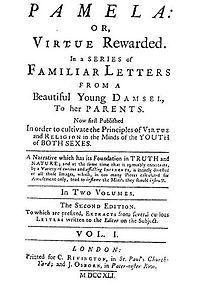- Charles Rivington
-
Charles Rivington Born 1688[1]
Chesterfield, Derbyshire, EnglandDied February 22, 1742
St. Paul's Churchyard, London, EnglandEducation apprenticed to Matthews Occupation Publisher Spouse Eleanor Pease Children thirteen[1] Parents Thurston Rivington Charles Rivington (1688 – February 22, 1742), British publisher, eldest son of Thurston Rivington,[1] was born at Chesterfield, Derbyshire, in 1688.
Coming to London as apprentice to a bookseller, he took over in 1711 the publishing business of Richard Chiswell (1639–1711), and, at the sign of the Bible and the Crown in Paternoster Row, he carried on a business almost entirely connected with theological and educational literature. He published one of George Whitefield's earliest works, 'The Nature and Necessity of a new Birth in Christ' (1737)[2] and brought out an edition of the Imitation of Christ. George Whitefield at that time was acknowledged as the leader of Methodism and he was preaching to thousands. He recounts how he was approached by Charles Rivington[3] and had to be persuaded that this was the correct course. Rivington published A General History of the Pyrates in 1724, containing vivid biographies of contemporary English and Welsh pirates.[4]
 Samuel Richardson's Pamela - at the bottom of the page is the publishers. Samuel, who was also from Derbyshire explains how he too was persuaded by Rivingtom to submit a novel in letters.
Samuel Richardson's Pamela - at the bottom of the page is the publishers. Samuel, who was also from Derbyshire explains how he too was persuaded by Rivingtom to submit a novel in letters.
In 1736 Rivington with Bettesworth[1] founded the company of booksellers who called themselves the "New Conger," in rivalry with the older association, the "Conger," dating from about 1700. In 1741 he published the first volume of Samuel Richardson's novel, Pamela.
After his death, Charles Rivington was succeeded by his two sons, John (1720–1792) and James (1724–1802). James emigrated to America, and pursued his trade in New York; John carried on the business on the lines marked out by his father, and was the great Church of England publisher of the day. In 1760 he was appointed publisher to the Society for Promoting Christian Knowledge, and the firm retained the agency for over seventy years. Having admitted his sons Francis (1745–1822) and Charles (1754–1831) into partnership he undertook for the "New Conger" Association the issue of a standard edition of the works of Shakespeare, Milton, Locke and other British classics; also Cruden's Concordance. John Rivington died on January 16, 1792.
In 1810 John (1779–1841), the eldest son of Francis, was admitted a partner. In 1827 George (1801–1858) and Francis (1805–1885), sons of Charles Rivington, joined the firm. Rivington contracted further ties with the High Church party by the publication from 1833 of the Tracts for the Times. John Rivington died on November 21, 1841, his son, John Rivington (1812–1886) having been admitted a partner in 1836. George Rivington died in 1858; and in 1859 Francis Rivington retired, leaving the conduct of affairs in the hands of John Rivington and his own sons, Francis Hansard (born 1834) and Septimus (born 1846).
In 1890 the business was sold to Messrs Longmans. A business of the same character was, however, carried on from 1889 to 1893 by Mr Septimus Rivington and Mr John Guthrie Percival, as Percival & Co. This was changed in 1893 to Rivington, Percival & Co.; and in 1897 the firm revived its earlier title of Rivington & Co., maintaining its reputation for educational works and its connection with the Moderate and High Church Party.
References
- Septimus Rivington (1894), The House of Rivington, by); also the Publishers' Circular (January 15, 1885, June 2, 1890).
Notes
- ^ a b c d
 "Rivington, Charles". Dictionary of National Biography. London: Smith, Elder & Co. 1885–1900.
"Rivington, Charles". Dictionary of National Biography. London: Smith, Elder & Co. 1885–1900. - ^ Literary Anecdotes of the Eighteenth Century: Comprising Biographical ... By John Nichols, Samuel Bentley 1812
- ^ Pedlar in Divinity: George Whitefield and the Transatlantic Revivals, 1737–1770 By Frank Lambert
- ^ A general history of the robberies & murders of the most notorious pirates. By Charles Johnson Introduction and commentary by David Cordingly. Conway Maritime Press (2002).
- Attribution
 This article incorporates text from a publication now in the public domain: Chisholm, Hugh, ed (1911). Encyclopædia Britannica (11th ed.). Cambridge University Press.Categories:
This article incorporates text from a publication now in the public domain: Chisholm, Hugh, ed (1911). Encyclopædia Britannica (11th ed.). Cambridge University Press.Categories:- 1688 births
- British book publishers (people)
- People from Chesterfield
- 1742 deaths
Wikimedia Foundation. 2010.
